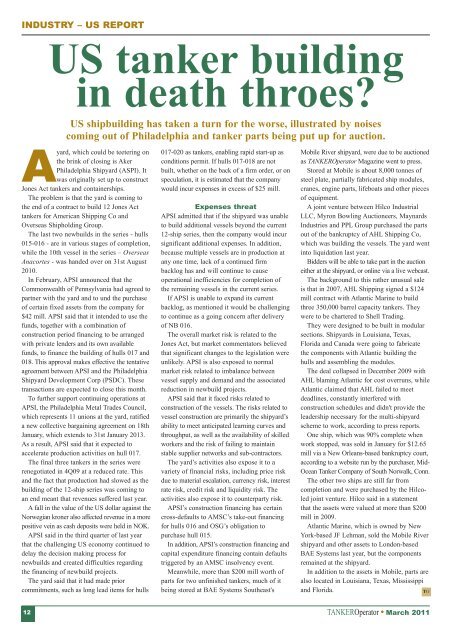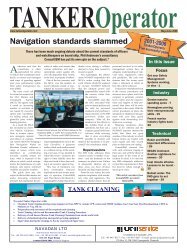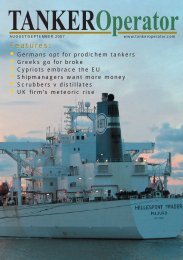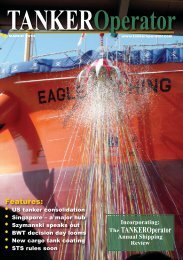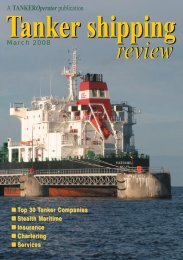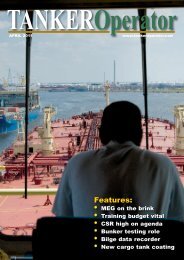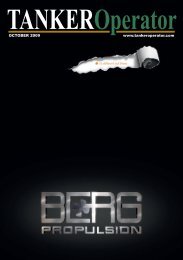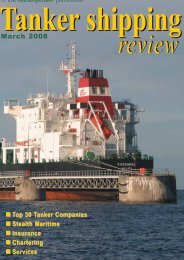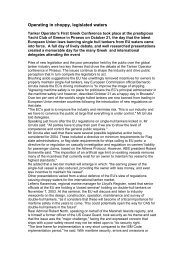The TA KEROperator - Tanker Operator
The TA KEROperator - Tanker Operator
The TA KEROperator - Tanker Operator
Create successful ePaper yourself
Turn your PDF publications into a flip-book with our unique Google optimized e-Paper software.
INDUSTRY – US REPORT<br />
US tanker building<br />
in death throes?<br />
US shipbuilding has taken a turn for the worse, illustrated by noises<br />
coming out of Philadelphia and tanker parts being put up for auction.<br />
Ayard, which could be teetering on<br />
the brink of closing is Aker<br />
Philadelphia Shipyard (ASPI). It<br />
was originally set up to construct<br />
Jones Act tankers and containerships.<br />
<strong>The</strong> problem is that the yard is coming to<br />
the end of a contract to build 12 Jones Act<br />
tankers for American Shipping Co and<br />
Overseas Shipholding Group.<br />
<strong>The</strong> last two newbuilds in the series - hulls<br />
015-016 - are in various stages of completion,<br />
while the 10th vessel in the series – Overseas<br />
Anacortes - was handed over on 31st August<br />
2010.<br />
In February, APSI announced that the<br />
Commonwealth of Pennsylvania had agreed to<br />
partner with the yard and to und the purchase<br />
of certain fixed assets from the company for<br />
$42 mill. APSI said that it intended to use the<br />
funds, together with a combination of<br />
construction period financing to be arranged<br />
with private lenders and its own available<br />
funds, to finance the building of hulls 017 and<br />
018. This approval makes effective the tentative<br />
agreement between APSI and the Philadelphia<br />
Shipyard Development Corp (PSDC). <strong>The</strong>se<br />
transactions are expected to close this month.<br />
To further support continuing operations at<br />
APSI, the Philadelphia Metal Trades Council,<br />
which represents 11 unions at the yard, ratified<br />
a new collective bargaining agreement on 18th<br />
January, which extends to 31st January 2013.<br />
As a result, APSI said that it expected to<br />
accelerate production activities on hull 017.<br />
<strong>The</strong> final three tankers in the series were<br />
renegotiated in 4Q09 at a reduced rate. This<br />
and the fact that production had slowed as the<br />
building of the 12-ship series was coming to<br />
an end meant that revenues suffered last year.<br />
A fall in the value of the US dollar against the<br />
Norwegian kroner also affected revenue in a more<br />
positive vein as cash deposits were held in NOK.<br />
APSI said in the third quarter of last year<br />
that the challenging US economy continued to<br />
delay the decision making process for<br />
newbuilds and created difficulties regarding<br />
the financing of newbuild projects.<br />
<strong>The</strong> yard said that it had made prior<br />
commitments, such as long lead items for hulls<br />
017-020 as tankers, enabling rapid start-up as<br />
conditions permit. If hulls 017-018 are not<br />
built, whether on the back of a firm order, or on<br />
speculation, it is estimated that the company<br />
would incur expenses in excess of $25 mill.<br />
Expenses threat<br />
APSI admitted that if the shipyard was unable<br />
to build additional vessels beyond the current<br />
12-ship series, then the company would incur<br />
significant additional expenses. In addition,<br />
because multiple vessels are in production at<br />
any one time, lack of a continued firm<br />
backlog has and will continue to cause<br />
operational inefficiencies for completion of<br />
the remaining vessels in the current series.<br />
If APSI is unable to expand its current<br />
backlog, as mentioned it would be challenging<br />
to continue as a going concern after delivery<br />
of NB 016.<br />
<strong>The</strong> overall market risk is related to the<br />
Jones Act, but market commentators believed<br />
that significant changes to the legislation were<br />
unlikely. APSI is also exposed to normal<br />
market risk related to imbalance between<br />
vessel supply and demand and the associated<br />
reduction in newbuild projects.<br />
APSI said that it faced risks related to<br />
construction of the vessels. <strong>The</strong> risks related to<br />
vessel construction are primarily the shipyard’s<br />
ability to meet anticipated learning curves and<br />
throughput, as well as the availability of skilled<br />
workers and the risk of failing to maintain<br />
stable supplier networks and sub-contractors.<br />
<strong>The</strong> yard’s activities also expose it to a<br />
variety of financial risks, including price risk<br />
due to material escalation, currency risk, interest<br />
rate risk, credit risk and liquidity risk. <strong>The</strong><br />
activities also expose it to counterparty risk.<br />
APSI’s construction financing has certain<br />
cross-defaults to AMSC’s take-out financing<br />
for hulls 016 and OSG’s obligation to<br />
purchase hull 015.<br />
In addition, APSI’s construction financing and<br />
capital expenditure financing contain defaults<br />
triggered by an AMSC insolvency event.<br />
Meanwhile, more than $200 mill worth of<br />
parts for two unfinished tankers, much of it<br />
being stored at BAE Systems Southeast's<br />
Mobile River shipyard, were due to be auctioned<br />
as <strong>TA</strong><strong>KER<strong>Operator</strong></strong> Magazine went to press.<br />
Stored at Mobile is about 8,000 tonnes of<br />
steel plate, partially fabricated ship modules,<br />
cranes, engine parts, lifeboats and other pieces<br />
of equipment.<br />
A joint venture between Hilco Industrial<br />
LLC, Myron Bowling Auctioneers, Maynards<br />
Industries and PPL Group purchased the parts<br />
out of the bankruptcy of AHL Shipping Co,<br />
which was building the vessels. <strong>The</strong> yard went<br />
into liquidation last year.<br />
Bidders will be able to take part in the auction<br />
either at the shipyard, or online via a live webcast.<br />
<strong>The</strong> background to this rather unusual sale<br />
is that in 2007, AHL Shipping signed a $124<br />
mill contract with Atlantic Marine to build<br />
three 350,000 barrel capacity tankers. <strong>The</strong>y<br />
were to be chartered to Shell Trading.<br />
<strong>The</strong>y were designed to be built in modular<br />
sections. Shipyards in Louisiana, Texas,<br />
Florida and Canada were going to fabricate<br />
the components with Atlantic building the<br />
hulls and assembling the modules.<br />
<strong>The</strong> deal collapsed in December 2009 with<br />
AHL blaming Atlantic for cost overruns, while<br />
Atlantic claimed that AHL failed to meet<br />
deadlines, constantly interfered with<br />
construction schedules and didn't provide the<br />
leadership necessary for the multi-shipyard<br />
scheme to work, according to press reports.<br />
One ship, which was 90% complete when<br />
work stopped, was sold in January for $12.65<br />
mill via a New Orleans-based bankruptcy court,<br />
according to a website run by the purchaser, Mid-<br />
Ocean <strong>Tanker</strong> Company of South Norwalk, Conn.<br />
<strong>The</strong> other two ships are still far from<br />
completion and were purchased by the Hilcoled<br />
joint venture. Hilco said in a statement<br />
that the assets were valued at more than $200<br />
mill in 2009.<br />
Atlantic Marine, which is owned by New<br />
York-based JF Lehman, sold the Mobile River<br />
shipyard and other assets to London-based<br />
BAE Systems last year, but the components<br />
remained at the shipyard.<br />
In addition to the assets in Mobile, parts are<br />
also located in Louisiana, Texas, Mississippi<br />
and Florida.<br />
TO<br />
12<br />
<strong>TA</strong>N<strong>KER<strong>Operator</strong></strong> March 2011


